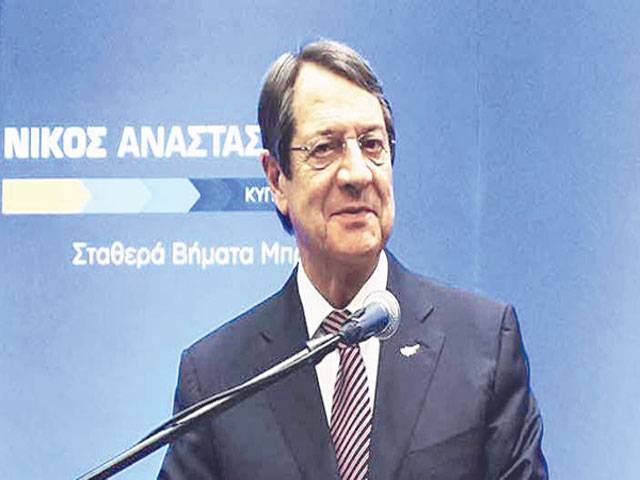NICOSIA - Cypriot President Nicos Anastasiades looked set for a run-off against a dovish challenger after he failed to win a majority at a vote Sunday despite finishing first, an exit poll showed. A forecast by state broadcaster CyBC after polls closed put the conservative incumbent on 38-42 percent ahead of Communist-backed Stavros Malas on 27-31 percent as the divided Mediterranean island weighs up whether to make a fresh push to reunite.
If the exit poll proves right the two candidates will go head-to-head in a second round of voting next Sunday.
Anastasiades - who is seeking a second and final five-year term in the European Union's most easterly member - has pledged to restart talks promptly with the Turkish-backed north after they collapsed last year in acrimony.
Malas, a former health minister who lost out to Anastasiades in 2013, is firmly in favour of a deal to reunite the country and has criticised the president for not going far enough.
There now looks set to be intense jockeying behind the scenes to secure the support of the losing candidates, above all predicted third place finisher Nikolas Papadopoulos, a former president's son who takes a tougher line on talks.
Two other exit polls had Anastasiades well ahead but made the race for second place closer to call.
Turnout was well down on five years ago at 71.4 percent as apathy among young voters fed up with an insular system appears on the rise.
Former lawyer Anastasiades - under the slogan "Steady Steps Forward" - has taken credit for an impressive recovery by the European Union's most easterly member since a debilitating financial crisis in 2013.
After voting earlier in his hometown of Limassol Anastasiades called for "sobriety" and unity after the vote.
As always, the nearly 44-year division of the island between the internationally recognised Greek-majority Republic of Cyprus and a Turkish Cypriot statelet in the north looms large.
In July, two years of UN-backed talks between Anastasiades and Turkish Cypriot leader Mustafa Akinci came closer than ever to reunifying the island but then collapsed in acrimony.
Despite the failure to bridge key issues, including the future of tens of thousands of Turkish troops in the north, Anastasiades insists he wants talks with Akinci to restart soon.
But there is deep scepticism internationally over whether the political will for a breakthrough exists.
"The economy is doing reasonably well - but for me the main criterion is still the Cyprus problem," said university lecturer Andres Karageorghis after voting at a school in Nicosia.
"To carry on and hopefully find a solution."
There are clear warning signs that the road to reunification will only get tougher as fatigue mounts after decades of failure.
For the first time ultra-nationalist party ELAM - fiercely opposed to the proposed reunification - is fielding a candidate.
While the "national problem" is ever present, this time around the economy has been a dominant issue.
When Anastasiades became president, the banking sector was in meltdown and he took a 10 billion euro (more than $12 billion) bailout that entailed biting austerity measures.
That included a drastic "haircut" on accounts of more than 100,000 euros held in the country's largest lender, Bank of Cyprus.
Since then, the economy has rebounded faster than many people expected, and growth has been steady since 2015.
Tourism reached a record high last year and explorations are going on for oil and gas deposits offshore.
Analysts warn there are still major challenges, however.
The economy is still smaller than it was before the crisis, unemployment is around 11 percent and banks are awash with bad loans.
Final official results are expected by 1830 GMT.






